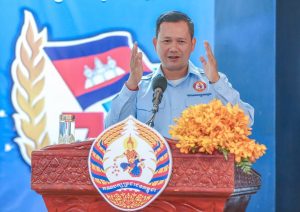Cambodian Prime Minister Hun Sen moved to shore up his family dynasty and the leadership prospects for his eldest son over the Christmas-New Year period, indicating he will stand down after elections in 2023.
The latest political maneuvering was delivered at the 43rd Central Committee Meeting of the 5th Mandate of the Cambodian People’s Party (CPP) with Hun Sen stating: “I will become father of the prime minister after 2023 and the grandfather of the prime minister in 2030s.”
Elections in Cambodia are held every five years, with the next due in July 2023.
Hun Sen, who is 69 years of age, also said he intended to pass a law imposing an age limit on future prime ministers which should be restricted to “between 70 and 72 years old” and this could be passed alongside laws restricting leaders to single Cambodian citizenship.
That would will only add to the woes of senior opposition figures Sam Rainsy, 72, and Kem Sokha, 68. Both are from the outlawed Cambodian National Rescue Party (CNRP), which has been gutted by the courts after it was accused of plotting to topple the government.
No limits will be placed on the number of elected mandates.
Hun Manet, a West Point graduate, commander of the Royal Cambodian Army, and Hun Sen’s eldest son, “was elected as a candidate” unanimously by the Central Committee for the job of future prime minister.
The wording in a flurry of press releases following the meet was clumsy but importantly, analysts said, Hun Sen had stamped his authority over the succession issue with Hun Manet’s chief rival for the top job, Interior Minister Sar Kheng, aged 70, saying he would abide CPP decisions.
Leadership speculation has been a hallmark of Hun Sen’s tenure, the region’s longest serving leader, who has been in charge for more than 36 years. In March, last year, he declared he would rule “until I want to stop” and a year earlier he said he would rule for another 10 years.
Other candidates appear to have been ruled out, including the Minister for Economy and Finance Minister, Aun Pornmoniroth, who emerged as a potential candidate in late 2020. Hun Sen said his former personal secretary would hold onto his current position after he retires as prime minister.
CPP machinations, rooted in the secrecy of Khmer Rouge defections dating back to the late 1970s, also appear to have ruled Hun Sen’s other sons out of contention: Hun Manith, a Brigadier General in the army and Hun Many, the sitting member of parliament for Kampong Speu province.
On paper, at least, that appears to offer Hun Manet a clean run at the leadership when it falls due, assuming the National Assembly, where the CPP controls all 125 seats, passes the age restriction laws sought by Hun Sen.
Under such laws, Joe Biden could not have stood for the U.S. elections, Donald Trump would have been barred from seeking a second term, and China’s Xi Jinping would be forced to stand down in two years, ending his dream of being emperor for life.
However, those laws may not sit comfortably with the CPP’s old guard.
The party remains factionalized and access to the inner sanctum has historically been limited to those who defected from the ranks of the Khmer Rouge, amid a purge of their own, before returning with 150,000 Vietnamese troops and ousting Pol Pot from power in early 1979.
Among them was the current Defense Minister Tea Banh and Gen. Men Sam An, who were elected as CPP vice presidents during the recent Central Committee Meeting.
Sar Kheng has held the position of CPP vice president since 2015 and Hun Manet’s rise will still depend upon old guard support after Hun Sen stands down, particularly with regard to age restriction laws.
Sources have also said Hun Sen could assume the mantle of senior minister in much the same way as Singapore’s founding father Lee Kuan Yew did after retiring as prime minister in 1990.

































